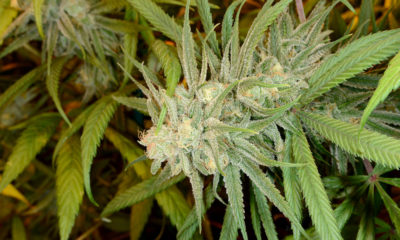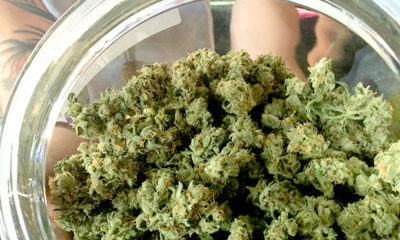
Medical
Yet Another Pot-Psychosis Link Claimed: More Reefer Madness?
Once again, a scientific study with questionable assumptions linking cannabis use to psychiatric maladies gets widespread and sensationalistic media play.
Does daily cannabis use, especially of high-potency “skunk” strains, lead to an increased risk of developing psychosis? Based on recent media coverage, you can be forgiven for thinking so. But you should really take a closer look before you believe the hype.
The newest study to find itself in the media spotlight follows a string
Distorted Claims
Perhaps some. However, you should start by noting the caveat in the very first sentence in study’s official summary of the findings: “Cannabis use is associated with increased risk of later psychotic disorder but whether it affects
Contrast this with the portrayals in the press coverage. The NBC headline reads: “Daily use of high potency marijuana linked to higher rates of psychosis, study finds.” Britain’s Daily Mail went with: “Powerful ‘skunk’ which is 94 percent of the cannabis on London’s streets raises psychosis risk five-fold.”
The study looked at cannabis use in 900 individuals in 12 cities across Europe and Brazil. The strains being used were identified as either high-potency (at least 10 percent THC) or low, although some guesswork seems to be involved here. As stated in NBC’s paraphrase of the findings: “Across the 12 sites, people who used any type of cannabis on a daily basis were three times more likely to have a diagnosis of a new episode of psychosis, compared with people who had never used cannabis, the researchers concluded. This increased to five times more likely for daily use of high-potency cannabis.”
And the link was found to be strongest in London and Amsterdam where high-potency strains are
“Linked with” is something of a weasel phrase here. If more people per capita are using cannabis in Amsterdam, then a higher proportion of those diagnosed as psychotic in Amsterdam will be cannabis users. This does not necessarily imply causality; hence the caveat in the official summary of the findings. But the study’s authors struck a less cautious tone when talking to the media.
“Our findings are consistent with previous studies showing that the use of cannabis with a high concentration of THC, also known as skunk-like cannabis, has more harmful effects on mental health than weaker forms,” NBC quoted Dr. Marta Di Forti of the Institute of Psychiatry, Psychology, and Neuroscience at King’s College. “For the first time we have consistent evidence that there is a dose-dependent relationship between cannabis use and induced psychosis at a population level. The more cannabis you consume the more likely you are to develop a psychotic disorder.”
Di Forti was even more direct in her comment to the Daily Mail: “THC is the culprit in the psychotic events.” She even asserted that if “skunk” was taken off the streets of London, new cases of psychosis would drop 30 percent, from 46 to 32 cases per 100,000 people.
These are grossly irresponsible claims that reporters at NBC and the Daily Mail should have questioned rather than credulously echoed. First, they go well beyond the more guarded findings of the study. Secondly, as we have argued before, there is a case to be made that high-potency strains are more beneficial, as they require users to smoke less to achieve the same effect — sparing the lungs exposure to tar and carcinogens. The assumption that users of “skunk” are all getting zonked out of their minds is an arbitrary one.
But there are more serious faulty assumptions at work here.
The Critics Respond
First and foremost is the probability that some users are self-medicating with pot, whether consciously or not — always a huge flaw in such studies. When scientists see a “link,” this really just means a correlation. And correlation (as the researchers admit when writing for peer-review and not media consumption) does not imply causality. In fact, they may be interpreting the data precisely backwards — cannabis may be alleviating the symptoms associated with “psychosis.”
Mitch Earleywine, a psychology professor at SUNY Albany and author of Understanding Marijuana: A New Look at the Scientific Evidence, contacted by Cannabis Now, noted that the Lancet study also looked at “control” groups classed by use of other drugs, cigarettes and alcohol, as well as education and income. “All of these variables have been linked to psychotic symptoms, but what does the title focus on? Cannabis.”
And the “link” to cannabis could be rooted in reasons other than causality. Earleywine postulated: “We probably have serious self-medication. A high-CBD strain could easily tranquilize some facets of psychotic symptoms. A teen who happened upon it in the underground market could spend a lifetime continuing to search for the same one.”
Earleywine also offers a critique of the prohibitionist assumptions behind the reportage (manifested in the call to get skunk “off the streets”): “Finally, let’s assume the risk is ‘real.’ Fine. If you have a first-degree relative with psychosis, don’t use cannabis. Let’s spread the word. No need to waste law enforcement time or wreck someone’s life. Just spread the word.”
Paul Armentano of NORML issued a statement responding to The Lancet study. He first bemoaned: “The notion that marijuana makes you crazy is back — and with a vengeance.”
Rather than the linear relationship now being portrayed, Armenatno points to studies indicating “a multi-directional association between cannabis and psychiatric illnesses.” For instance, a 2005 study by researchers at Erasmus Medical Center in Rotterdam was entitled: “Cannabis use predicts future psychotic symptoms, and vice versa.”
He notes that NORML itself has cautioned “that those predisposed to psychosis or other disorders may be at higher risk for adverse events. That said, it remains premature at best, and sensational at worst to claim that a causal relationship exists between marijuana use and psychiatric disorders on the basis of this new paper. That is because, by the observational nature of its design, this study at best can only demonstrate a correlation.”
Armentano protests that “despite this limitation, the authors boldly ‘assume causality.’ Given the fact that such a cause-and-effect relationship remains unproven and there as of yet exists no consensus among experts that such causation exists, their assumption is, at best, highly questionable.”
He also asserts that the association between “psychiatric illness” and cannabis use “may exist because many psychiatric patients are self-medicating with cannabis. Or, this relationship may persist because many people predisposed to psychosis are similarly predisposed to also using cannabis — a theory that is supported by many experts in the field.” Here he points to a 2016 study by researchers at the University of Wyoming, “Cannabis and Psychosis: a Critical Overview of the Relationship.”
“Perhaps most importantly,” Armentano continues, “the fact that cannabis has been used by various populations for decades at disparate rates, yet rates of psychosis and other psychiatric disorders have generally remained static over this same period of time, strongly argues against a direct causal relationship.” Here he refers to a 2009 study by researchers at England’s Keele University, “Assessing the impact of cannabis use on trends in diagnosed schizophrenia in the United Kingdom from 1996 to 2005.”
Finally, Armentano concludes that the concerns raised by the new Lancet study actually “provide an argument in favor of greater regulation of the plant so that it can be better kept out of the hands of young people and those who may be at higher risk for an adverse reaction. But maintaining cannabis prohibition, unfortunately, achieves neither result. Placed in this context, these latest scare-mongering claims — even if taken at face value — do little to advance arguments in favor of tightening prohibition, and provide ample ammunition to wage for its repeal.”
The mass media appear to be currently stirring or exploiting (returning to the question of causality!) a backlash against the recent gains for normalization of cannabis. So we can expect to see more such claims in the near future. It is advisable to develop a keen analysis, rather than swallowing them undigested.
TELL US, how do you decide if a source is reliable when reading about cannabis?























